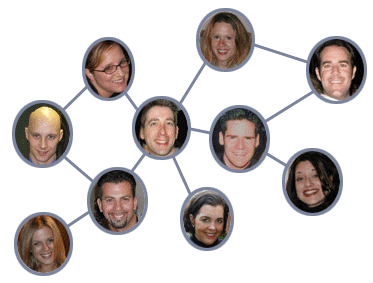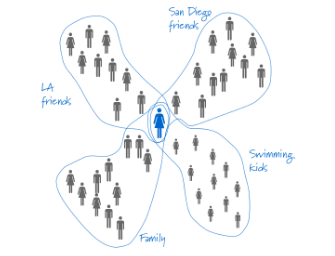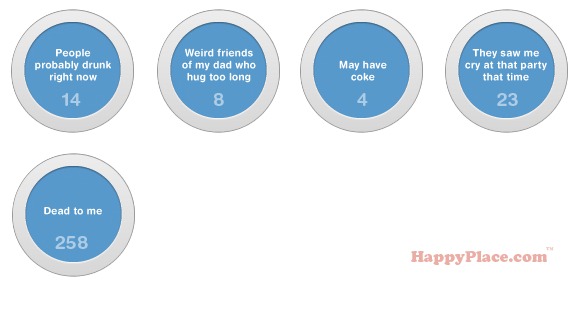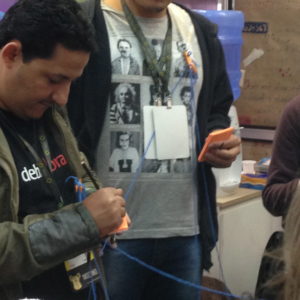Social networking websites offer value by mapping social relationships. As with any map, relationships are represented in a simplified way, a kind of metaphor. First was the connection, now we have the circle, and what I believe to be the next step is the cycle.
These relationships are evolving as long as technology companies figure out social dynamics and as long as individuals become aware of them and reject or hack current mappings. People are interested in mapping because it allows control.
Connection allows control over the possibilities of action. People are interested in mapping who they know just in case they will need them in the future. Connections put social information at people’s fingertips when they need to act.
But when people act, they build identities, which is both what people think who they are and what other’s think about them. What is tricky is that at different groups, people have different identities, depending on what they have done there and what they want to do in the future.
Connection based social networking websites don’t allow much control over identity. You can have only one profile and everything you do is propagated to all your contacts, irrespective of the standpoint you want to affirm among the groups you are engaged. This problem was thoroughly explored by Paul Adams on his influential The Real Life Social Network presentation.
Google+ proposed to solve this problem by offering a new metaphor to map social networks: circles. Circles allow control over identity. An action made in one group is solely visible for that group. Google+ says that circles are more like real life, but the circles are not shared. Each individual has to classify all his friends into circles, not necessarily in any agreement with real life groups.
One shortcoming that I noticed in Google+: the individual can have multiple circles, but only one profile. More often than not, the identities people build in each group are so different that they prefer to use different names, clothes, grammar. Actually, you can chose to show or hide profile information to specific circles, but you can’t use a different name or photo.
When I first saw the announcement of Google+, I thought they figured out a way to overcome what I think it’s the biggest hassle of social networking websites: people need to explicit set their relationships. Adding friends or classifying them into circles takes a lot of effort. I thought circles would be shared, as if I accept a shared circle, all contacts inside it would come together. That would, at least, distribute the task among my contacts.
What would be really breakthrough is being added to emergent circles. Circles that aggregate people with similar behavior patterns. Circles that fade in and fade out, according to group behavior. You can leave an emergent circle whenever you want, but even if you won’t do that explicitly, the circle would go away from you after a long period of inactivity.
The Cycle Metaphor
The circle metaphor is not enough for this kind of evolution. Better call them cycles. Cycles reflects all kinds of change in your life. If you move your living place, acquire new consumption habits, change your political mindset, start a new business, your social network changes. If the system knows the change is happening, why requiring you to manually update your network map?
But how can the system knows that? When people do such radical changes in their life, they ritualize it. They announce it publicly, they start breaking their behavior pattern, groups acknowledge it and manifest their acceptance or not. It’s a complex process, but doesn’t look so difficult to trace by the data people is already giving to services like Foursquare, Twittter, Dopplr.
Cycles allows control over your personal time. The time I’m speaking about is the time you say you don’t have when someone ask you to do something you can’t. “I don’t have time for that” means “That’s not important for me right now”. It’s not about the numbers on the clock or the money you can earn, it’s about your perception of what’s relevant in your life. I dream with a future where I won’t loose this precious time to irrelevant social networking websites.




